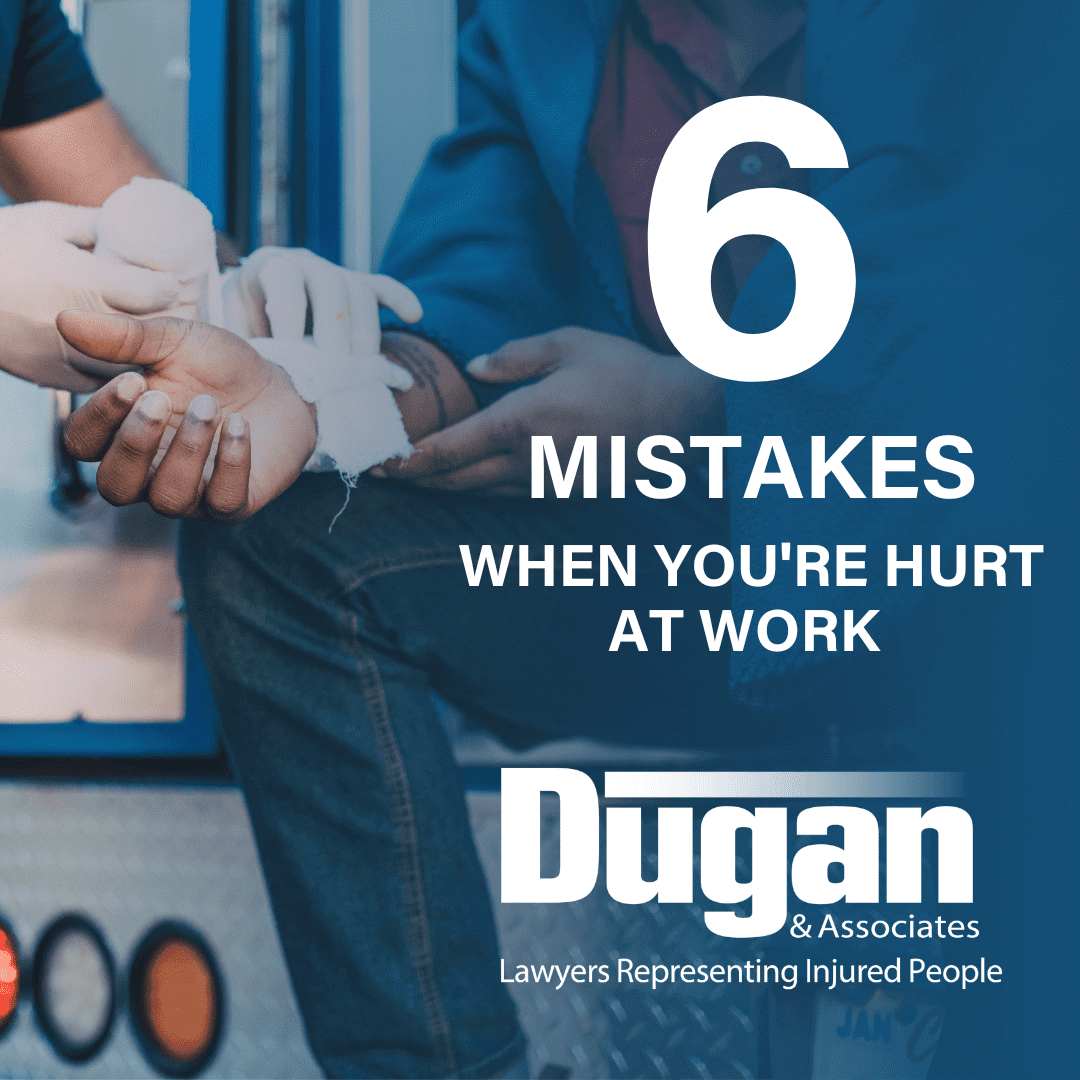
Do you work in construction or a trade? Maybe you work in transportation or a warehouse. Or you might be nurse or first responder. What do these professions have in common? Getting hurt at work. Muscle strains, lacerations, infections, broken bones, and other serious injuries happen often.
As Pittsburgh, Pennsylvania’s leading workers’ compensation law firm, we know how to help you get the compensation you deserve for your injury. We also see people make mistakes when they are injured on the job. These errors can drastically reduce their possible settlement and/or benefits.
Here are the top six mistakes people make when they get hurt at work.

It seems self-explanatory, but you may only pursue a worker’s compensation claim if your injury occurred while working and within the scope of your responsibilities as an employee. Injuries or diseases caused or aggravated by your employment are covered under workers' compensation, regardless of your previous physical condition.
What if you were intoxicated when the injury occurred? If your intoxication caused your injuries, you would likely be exempt from coverage. If you were injured when you violated a positive work order, you may not be entitled to workers’ compensation benefits. Additionally, if you hurt yourself on purpose while working, this too would not be covered.
Outside of the situations above though, negligence is not typically an influence on your case. Workers’ compensation cases aren’t the same as personal injury cases for car accidents, slips and falls, dog bites, etc. You receive medical treatment and are compensated for lost wages associated with a work-related injury or disease under the Pennsylvania Workmen's (Workers') Compensation Act. Your employer provides for the cost of the coverage but is then protected from direct lawsuits by employees for negligence and pain and suffering. You are covered for the entire period of your employment starting your very first day.
When you file a worker’s compensation claim, your employer will turn it into their insurance company. They will either accept liability and pay workers’ compensation loss wage benefits and for medical treatment or deny your claim. This is all done through Pennsylvania’s workers’ compensation system and is not a lawsuit.
If your claim is denied or ignored, you may file a lawsuit against your employer and their workers’ compensation insurance carrier for the workers’ compensation benefits you are entitled. It is mandatory for employers under Pennsylvania law to have workers’ compensation insurance. The lawsuit would be heard by a workers’ compensation judge. Likewise, if you are currently on workers’ compensation benefits and the insurance carrier wants to stop payments, they may have to file a lawsuit to obtain an order from a workers’ compensation judge to halt your benefits.
Understanding this difference is important. If you were injured at work in Pennsylvania, you will most likely find yourself negotiating a workers’ compensation claim; however, a lawsuit for workers’ compensation is also common. In both scenarios though, legal representation is important and beneficial.

When you are hurt at work in Pennsylvania, you must inform your supervisor or manager within 21 days. You must report the nature of your accident or injury and how it is work related. You should really do this in writing and not just verbally. No compensation will be due until such notice is given within 120 days. If you wait more than 120 days to tell your employer about your injury, you’ll lose your right to workers’ comp benefits.
The time limit for worker’s compensation claims involving an occupational disease is different, however. If you suffer from a disease that was caused or aggravated by your employment, you have three years to file a claim for workers’ comp benefits.
Workers’ compensation rejections and suspended benefits also have their own time limits:
Don’t delay in submitting the written report about your injury to your boss. A substantial number of claims happen among Pennsylvania employers. Many are already suspicious of any work-related injury claim. A delayed report will add to their doubt about your injury. Don’t have your integrity questioned. Get your injury report in promptly within the 21-day requirement, if at all possible, for payments to begin retroactively. Otherwise notice must be given within 120 days of the injury.
Don’t think that immediately reporting your injury to your supervisor will get you fired. It should not. If it does, you have may have grounds for a lawsuit.
Lastly, don’t think you’ll feel better in the morning. Even if you think the accident or incident is minor, reporting it right away is helpful. What if your condition worsens. What if you felt fine at the time, but over the next few days you realize something is wrong. Submitting a written report straight away establishes a paper trail that helps your claim for worker’s compensation benefits.
What is the total extent of your workplace injury? Make certain you share everything you are experiencing from your accident or incident when you're hurt at work. If a forklift ran over your foot, broke bones and tore muscle tissue but you also are suffering migraine headaches, please make this known in your written report to your manager. It could be important in the future in case your employer and their insurance company try to say you are claiming more than you are entitled.
What might be considered secondary injuries or symptoms related to a work accident or incident? It involves more than your serious pain and trauma. This is something for you and your doctor to decide. It can include, but is not limited to, the loss of motor functions, restricted movement, numbness and tingling, and weakness. These physical complaints are common after certain types of accidents. Blurry vision, nausea and vomiting are also common primary and secondary complaints in head injuries or exposure to chemicals.
Additionally, maintain open and clear communication about your pain, symptoms, and other complaints with your doctor or doctors. If after initial or early treatment you feel even worse, please share this with them. If you are noting improvement in some areas, great, relay this information to them too. It’s important for your doctors and healthcare providers to know about your condition in order to properly diagnose, treat, and/or restrict your work activities. It is important for your workers’ compensation benefits.
Regarding your doctors and treatment, they are ones that determine your work status. Typically, you will receive a simple and short statement such as: “no work,” “work with restrictions,” or “light duty.” If “work with restrictions” is stated, the constraints will be listed. Common restrictions include avoid heavy lifting, avoid heavy work, avoid kneeling or squatting, avoid uneven ground, light work, modified work, sedentary work, and emotional restrictions.
When the doctor/s tell you that you can return to work with or without restrictions, you should contact your employer to find out if they can accommodate your restrictions. This may be by offering the same job you had before or a new position. The position should honor any restrictions provided by the doctor/s.
Do you have to take the position your employer offers you? Yes. It is mandated by the Pennsylvania Workers’ Compensation laws that you cooperate in good faith. Failure to do so can jeopardize your entitlement to workers’ compensation benefits. This is even true if the new position provides a lower wage. If the position pays less than your pre-injury income, you will receive partial workers’ compensation wage loss payments from the workers’ comp insurance carrier. If you do not accept the position, your employer can terminate you for not coming to work.
Even if you believe that you won’t be able to perform the tasks associated with the position offered to you, you must try if within the restrictions of your doctor. If you show that the job responsibilities can’t be completed within your doctor’s restrictions, you can assert that you are unable to carry out the new role.

People often ridicule workers’ compensation lawyers, but this is a mistake. Workers’ compensation claims and lawsuits are complex. The Pennsylvania’s Workers’ Compensation Act is 144 pages in length. There are tens of chapters and hundreds of pages to the Pennsylvania Code for the Bureau of Workers’ Compensation. Most importantly, navigating convoluted connections between insurance carriers, employer claims, and medical treatments is an acquired skill developed over years of experience. Yes, you can represent yourself for a workers’ compensation claim or lawsuit, but it is foolish.
Will your employer and their insurance company have their own lawyers working on representing their own interest on your worker’s comp claim? You bet. When it comes to your workplace injury, your employer and their insurance company are not your friends. Not at all. They may seem welcoming and helpful, but don’t confuse this with them doing what is in your best interest. They won’t. They’re interested in paying you as little as possible for your injury or injuries, even going as far as denying your claim.
Do you think your workers’ compensation claim is an open and shut case? It is not. Insurance companies are experts in finding loopholes and using tricks. They manipulate people like you into making mistakes that damage your claim when you're hurt at work.
Did you know that there are special judges in Pennsylvania just to hear and settle workers’ compensation claims? Eighty-three Workers' Compensations Judges to be exact. There are also four judge managers, four administrative officers and 22 field offices with support staff. All of this is the Pennsylvania Department of Labor and Industry’s Workers’ Compensation Office of Adjudication (WCOA). It is responsible for the resolution of disputed workers’ compensation matters under the Pennsylvania Workers’ Compensation Act and the Occupational Disease Act. In 2015, Pennsylvania’s Workers’ Compensation Judges were assigned 45,000 matters. With something this big and complex, engaging a workers’ compensation attorney like Mitch Dugan or one of his associates is the wisest thing you can do when you get hurt at work.
If you or a loved one was hurt at work, don’t make any of the six mistakes we just reviewed. Mitch Dugan and his highly skilled and experienced workers’ compensation lawyers at Dugan & Associates will work vigorously to pursue fair and just compensation for loss of earnings, medical expenses, and damages. Consultations are free. If there is not a recovery of compensation, there is also no fee. Contact us today online or by telephone at 412-353-3572.
"*" indicates required fields